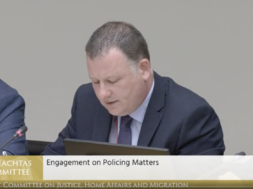· An additional 80 civilian staff to be deployed at the airport at border control booths on a 24/7 basis
· 125 Gardaí to be released from immigration functions at Dublin Airport
· Minister commits to examining and pursuing all opportunities to civilianise non–frontline Garda tasks
16 September, 2014
Frances Fitzgerald T.D, Minister for Justice and Equality, has today announced a major programme to civilianise immigration functions currently undertaken by members of An Garda Síochána. The Minister made the announcement while visiting the immigration control facilities at Dublin Airport.
A number of immigration functions, such as border management and registration of non-EEA persons’ permission to be in the State, are in the main carried out by or under the control of An Garda Síochána. These functions are exercised by Garda members acting as Immigration Officers under Ministerial powers.
Minister Fitzgerald stated: “As part of my focus on reforming policing in Ireland, I am committed to examining and pursuing all opportunities to civilianise non–frontline Garda tasks, to get Gardai out from behind desks and provide a visible policing service on the ground.”
“The civilianisation of immigration functions represents an important step forward in this effort as it will release some 125 Gardaí for other core policing duties.
“This initiative makes sense both from an efficiency and economic perspective. The programme, starting with Dublin Airport, will free up Garda members for other core policing duties while also allowing the immigration service of my Department to both reduce costs and continue to discharge the effective management of our border and immigration system.”
Border checks, undertaken at immigration booths on arrival at Dublin Airport, are at present largely carried out by Garda members. The initiative being announced today involved the deployment of an additional 80 civilian staff at the airport at border control booths on a 24/7 basis. This will result in approximately 125 Gardaí being redeployed; 75 as a result of the civilianisation of immigration checks at Dublin Airport and 50 from the transfer of the immigration permission registration function from An Garda Síochána to the Irish Naturalisation and Immigration Service of the Department of Justice and Equality (INIS).
This initiative builds on the existing civilian immigration role instigated by INIS at Dublin Airport and where 16 INIS staff are deployed on passport booth duties to the airport in Terminal 1 on a 9am-5pm basis
The work on the implementation of the first phase of this civilianisation programme will commence immediately and will release Gardaí carrying out frontline immigration checks at both terminals at Dublin Airport. Further phases commencing next year will focus on deploying civilian officers to other major ports of entry to the State (where this makes sense from a cost and efficiency perspective) and the transfer of the immigration permission registration function from An Garda Síochána to the Irish Naturalisation and Immigration Service of the Department of Justice and Equality. The move to a 24/7 civilian operation in Terminal 1 is expected to be completed next summer with Terminal 2 completed by December, 2015.
The Minister said: “The establishment of a permanent frontline uniformed civilian border control unit is a step-change in the State’s approach to managing our borders. However, it is only right that the commitment and contribution of An Garda Síochána to protecting our borders since the foundation of the State be given full recognition and our deepest appreciation. They will continue to provide core policing functions at the Airport and support the civilian staff as appropriate.”
Minister Fitzgerald also held discussions with the Dublin Airport Authority on plans for greater use of border management technologies such as automatic border controls and advance passenger information systems to make the entry experience at Dublin Airport as smooth as possible while maintaining the integrity of our main entry point to the State.
Commenting on the role of technology in managing our borders, the Minister said that, “Modern technology such as e-gates facilitates smarter, secure and more cost effective management of our borders.”
“While we must remain vigilant in preventing individuals entering our country who have no right to be here, we must also make every effort to the make the entry experience as smooth as possible for genuine travellers who constitute the vast majority of people travelling through our air and sea ports. Border technology is one of the key ways to achieve that objective.”
Since May 2013 four e-Gates have been operational in Terminal 1 on a pilot basis. Minister Fitzgerald confirmed that the Irish Naturalisation and Immigration Service (INIS) were currently preparing a comprehensive business case for the expansion of the e-Gates initiative.
The Minister stated: “Extending the use of modern technology in all areas of policing and security must be seen as another critical element of Garda reform and is one which I will champion as Minister.”
Minister Fitzgerald also outlined details of a further major reform of the delivery of immigration services which will see the transfer of the registration function for non-EEA nationals from An Garda Síochána, who currently have statutory responsibility for this function, to the Irish Naturalisation and Immigration Service (INIS). This will replace the current arrangements whereby the immigration registration function is carried out by An Garda Síochána at the immigration HQ in Burgh Quay (for the Dublin Metropolitan Area) and in some 75 or so Stations around the country with a streamlined regional structure of a small number of offices in locations around the State. The Minister stated that she had obtained the agreement of her colleague Minister Richard Bruton to bring forward the necessary legislative changes to make the transfer possible in the Employment Permits (Amendment) Act, 2014 which enacted before the summer recess. It is estimated that the transfer of the registration function will result in the release of Gardaí to core duties – estimated at 50 full time equivalents
Notes for Editors
The objective of this proposal is to transfer passport booth duties from Garda immigration officers to civilian immigration officers of the Irish Naturalisation and Immigration Service (INIS), Department of Justice and Equality. These duties include passport inspection and making decisions on the granting of permission to enter the State. An Garda Síochána will continue to play a key role in the immigration area in functions traditional to policing such as investigations, arrest and detention.
The registration function for non-EEA nationals currently undertaken by An Garda Síochána is administrative in nature requiring persons registering their permission in the State to supply certain particulars such as their biographical details, address in the State, occupation etc., supplying biometric details in the form of a fingerprint, and being issued with a registration certificate at the end of the process.
ENDS…./









